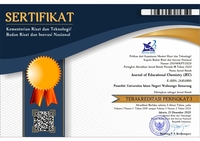Voltaic Cell Learning Design Using the RADEC (Read, Answer, Discuss, Explain, and Create) Model Oriented toward the Pancasila Student Profile
DOI:
https://doi.org/10.21580/jec.2023.5.1.13746Keywords:
pancasila student profile, RADEC learning model, voltacic cellAbstract
This study aimed to describe the Voltaic Cell learning design using the RADEC (Read, Answer, Discuss, Explain, and Create) learning model based on the Pancasila Student Profile. The approach employed in this research was descriptive qualitative. The research instrument was a validation sheet in the form of a questionnaire administered to five validators, consisting of two Expert Lecturers in Chemistry Education at Universitas Pendidikan Indonesia and three Chemistry teachers who taught at Sekolah Penggerak in Bandung City, employing the Merdeka Curriculum. The data processing results demonstrated an average percentage of 96.7% for the alignment of the lesson plan across four aspects: Formulation of Competency Achievement Indicators and Learning Objectives, Presented Content, Language Usage, and Time Allocation. The findings also indicated a connection between the voltaic cell learning activities using the RADEC learning model and the manifestation of the Pancasila Student Profiles, including Faith in God Almighty, Noble Characters, Global Diversity, Mutual Cooperation, Independence, Critical Reasoning, and Creativity, producing an average percentage of 95.4% classified into the excellent category. Hence, this study signified that the voltaic cell learning design using the RADEC model could cultivate the Pancasila Student Profile.Downloads
References
Alhamuddin. 2014. Sejarah Kurikulum di Indonesia (Studi Analisis Kebijakan Pengembangan Kurikulum). Nur El-Islam, 1(2), 48–58.
Chairunnisa, C. C., Prihantini, & Sukardi, R. R. 2022. Model Read, Answer, Discuss, Explain, and Create untuk Meningkatkan Hasil Belajar IPS Siswa Pada Pembelajaran Daring. Jurnal Educatio FKIP UNMA, 8(1), 151–156.
Huberman, A. M. & Miles, B. M. 2014. Qualitative Data Analysis. 3rd ed. SAGE: Singapore.
Juliani, A. J., & Bastian, A. 2021. Pendidikan Karakter sebagai Upaya Wujudkan Pelajar Pancasila. Prosiding Seminar Nasional Pendidikan Program Pascasarjana Universitas PGRI Palembang, 257–265.
Kemendikbudristek. 2021. Panduan Pengembangan Projek Penguatan Profil Pelajar Pancasila. Jakarta: Kementerian Pendidikan Dan Kebudayaan.
Kemendikbudristek. 2022. Kurikulum untuk Pemulihan Pembelajaran. Jakarta: Pusat Kurikulum dan Pembelajaran Badan Standar, Kurikulum, dan Asesmen Pendidikan Kementerian Pendidikan, Kebudayaan, Riset, dan Teknologi.
Kind, P. M., & Kind, V. 2007. Creativity in Science Education: Perspectives and Challenges for Developing School Science. Studies in Science Education, 43(1), 1-37.
Lyesmaya, D., Sopandi, W., Handayani, H., Suryana, N., Satria, E., Jumanto, Adi, Y. K., & Imran, M. E. 2018. R-A-D-E-C : a Learning Language Perspective in Elementary School. ICEE 2018 International Conference on Elementary Education Universitas Pendidikan, July 2019, 514–518.
Merdekawati, K. 2015. Implementation of Character Education in Chemistry Learning. Proceding The 1st International Seminar on Chemical Education 2015, 54-66.
Mundilarto. 2012. Penilaian Hasil Belajar Fisika. Yogyakarta: UNY Press.
Nasrudin, D., Rochman, C., Hidayat, A., & Kariadinata, R. 2018. How to Integrate Character Education in Science Learning?. The 2nd International Conference on Sociology Education (ICSE 2017), 215–219.
Pratama, Y. A., Sopandi, W., & Hidayah, Y. 2019. RADEC Learning Model (Read-Answer-Discuss-Explain And Create): The Importance of Building Critical Thinking Skills In Indonesian Context. International Journal for Educational and Vocational Studies, 1(2), 109–115.
Sopandi, W. 2017. The Quality Improvement of Learning Processes and Achievements Through The Read-Answer-Discuss-Explain-and Create Learning Model Implementation. Proceeding 8th Pedagogy International Seminar 2017: Enhancement of Pedagogy in Cultural Diversity Toward Excellence in Education, 8(229), 132–139.
Sopandi, W. 2019. Sosialisasi dan Workshop Implementasi Model Pembelajaran RADEC Bagi Guru-Guru Pendidikan Dasar dan Menengah. PEDAGOGIA: Jurnal Pendidikan, 8(1), 19-34.
Sukmawati, D., Sopandi, W., Sujana, A., & Muharam, A. 2021. Kemunculan Aspek Karakter Siswa SD melalui Pembelajaran RADEC dengan Menggunakan WhatsApp pada Materi Siklus Air. Jurnal Basicedu, 5(2), 1787–1798.
Maruf, A. S., Wahyu, W., & Sopandi, W. 2020. Colloidal Learning Design using Radec Model with STEM. Journal of Educational Sciences, 4(4), 758–765.
Downloads
Published
How to Cite
Issue
Section
License
The copyright of the received article shall be assigned to the journal as the publisher of the journal. The intended copyright includes the right to publish the article in various forms (including reprints). The journal maintains the publishing rights to the published articles.
Authors are permitted to disseminate published articles by sharing the link/DOI of the article at the journal. Authors are allowed to use their articles for any legal purposes deemed necessary without written permission from the journal with an acknowledgment of initial publication to this journal.

This work is licensed under a Creative Commons Attribution-NonCommercial-ShareAlike 4.0 International License.


